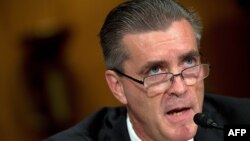ISLAMABAD —
U.S. Ambassador to Pakistan Richard Olson has been Washington's top diplomat in Islamabad since late 2012, at a time when the two countries have focused on repairing their often strained relationship. He expressed concerns over Pakistan's nuclear arsenal, the situation in Afghanistan and the fight against militant groups in Pakistan's tribal regions.
Relations between the United States and Pakistan have been turbulent especially since the beginning of 2011 when a secret U.S. military raid located and killed Osma bin Laden deep inside Pakistani territory.
Ties were plunged to historic lows a few months later when a NATO airstrike killed 24 Pakistani soldiers on the Afghan border. But Ambassador Olson said both countries have since emerged from that difficult phase.
"I think that the relationship has been on a much more positive trajectory since that time and particularly over the last eight months. Both sides recognized that we have more in common than we had that diverge between our two countries and that we would work on the bases of common interests and on the bases of mutual respect to move the relationship forward," stated Olson.
A key issue between the two sides remains the militant groups based in Pakistan’s tribal areas along the Afghan border. U.S. drone strikes on the groups draw the ire of the Pakistani government, and the public.
In the past, the United States has pressed Pakistan to more aggressively crack down on the militants. Ambassador Olson praised Pakistan's role in the war against terrorism but said the presence of militant groups like the Haqqani network on Pakistani soil remains a matter of concern for Washington.
He avoided direct comment on efforts by Pakistan's Prime Minister Nawaz Sharif to try to engage in peace talks with outlawed organizations like the Tehrik-e-Taliban Pakistan.
"Our policy and what we favor is that the Pakistan government extending its writ to through all of its territory whatever means are chosen, whatever methods are chosen that is up to the government of Pakistan," said Olson.
Some critics foresee trouble in Pakistan-U.S. relations after the American military mission ends in Afghanistan because of long-running concerns in Washington over the security of the Pakistani nuclear arsenal.
Reports in American media recently have suggested the United States is seeking bases in Afghanistan past 2014 to ensure it can quickly mobilize forces to prevent Pakistani nuclear weapons from falling into the hands of Islamist militants.
Ambassador Olson dismissed those reports. "I think what is really important here is to refer back to what President Obama said after the visit of Prime Minister Nawaz Sharif, which is that we have confidence in Pakistan's nuclear safeguards and its responsible position as a nuclear weapons state and that has not changed and that does not change with a few anonymously sourced comments that may appear in the press," he said.
Olson said that the United States has recently expanded its cooperation with Pakistan particularly in the energy sector to help the country overcome critical power shortages. He says the U.S. assistance has enabled power generation facilities to add 1000 megawatts of badly-needed electricity to Pakistan’s national grid.
Relations between the United States and Pakistan have been turbulent especially since the beginning of 2011 when a secret U.S. military raid located and killed Osma bin Laden deep inside Pakistani territory.
Ties were plunged to historic lows a few months later when a NATO airstrike killed 24 Pakistani soldiers on the Afghan border. But Ambassador Olson said both countries have since emerged from that difficult phase.
"I think that the relationship has been on a much more positive trajectory since that time and particularly over the last eight months. Both sides recognized that we have more in common than we had that diverge between our two countries and that we would work on the bases of common interests and on the bases of mutual respect to move the relationship forward," stated Olson.
A key issue between the two sides remains the militant groups based in Pakistan’s tribal areas along the Afghan border. U.S. drone strikes on the groups draw the ire of the Pakistani government, and the public.
In the past, the United States has pressed Pakistan to more aggressively crack down on the militants. Ambassador Olson praised Pakistan's role in the war against terrorism but said the presence of militant groups like the Haqqani network on Pakistani soil remains a matter of concern for Washington.
He avoided direct comment on efforts by Pakistan's Prime Minister Nawaz Sharif to try to engage in peace talks with outlawed organizations like the Tehrik-e-Taliban Pakistan.
"Our policy and what we favor is that the Pakistan government extending its writ to through all of its territory whatever means are chosen, whatever methods are chosen that is up to the government of Pakistan," said Olson.
Some critics foresee trouble in Pakistan-U.S. relations after the American military mission ends in Afghanistan because of long-running concerns in Washington over the security of the Pakistani nuclear arsenal.
Reports in American media recently have suggested the United States is seeking bases in Afghanistan past 2014 to ensure it can quickly mobilize forces to prevent Pakistani nuclear weapons from falling into the hands of Islamist militants.
Ambassador Olson dismissed those reports. "I think what is really important here is to refer back to what President Obama said after the visit of Prime Minister Nawaz Sharif, which is that we have confidence in Pakistan's nuclear safeguards and its responsible position as a nuclear weapons state and that has not changed and that does not change with a few anonymously sourced comments that may appear in the press," he said.
Olson said that the United States has recently expanded its cooperation with Pakistan particularly in the energy sector to help the country overcome critical power shortages. He says the U.S. assistance has enabled power generation facilities to add 1000 megawatts of badly-needed electricity to Pakistan’s national grid.




